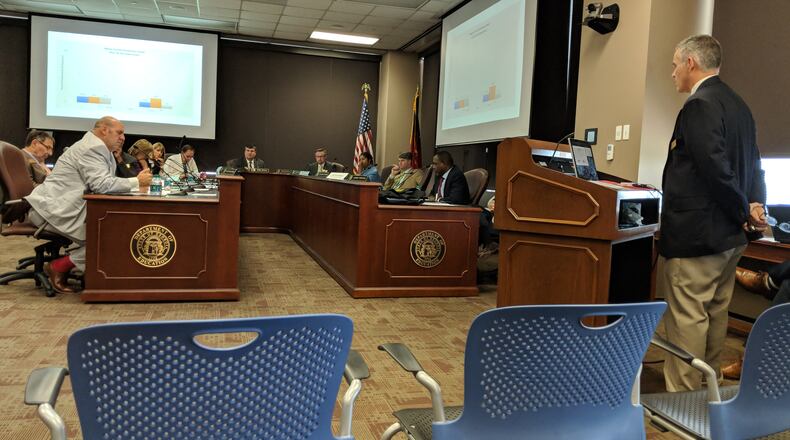A tiny rural school district south of Atlanta is pushing back against Georgia’s state-mandated “turnaround” program.
Leaders of the Macon County School System traveled to Atlanta Wednesday to ask why they were targeted for intervention when there were lower-performing schools to choose from.
The complaint was aimed at Chief Turnaround Officer Eric Thomas and his bosses on the state Board of Education.
Although several metro Atlanta school districts have said they'd rather fix their low-performing schools without Thomas, this was the first objection by a school district at an open state board meeting.
“We’ve been told by the Turnaround Office that we’ve been tagged as a turnaround district,” Macon Superintendent Marc Maynor said.
Why was Macon County Elementary chosen, he asked, and how does it exit the program?
Thomas clarified that the school had not been formally inducted and said it didn’t have to participate. “We’re not going to force anybody to marry us,” he said, a phrase he’s used before to describe what is currently a voluntary program. But he said the school’s poor performance on standardized state tests made it eligible for intervention under the First Priority Act.
Lawmakers passed the law last year at the request of Gov. Nathan Deal, after voters rejected his constitutional amendement to allow the takeover of “chronically failing” schools.
Without that amendment, the state cannot unilaterally take control of schools, but the new law provides leverage to prod districts into allowing it to happen. School boards that partner with Thomas risk loss of control if their schools don’t improve, but face consequences if they refuse to go along.
The cudgel behind the new law is essentially financial: The state board can force districts to comply with costly state mandates, such as caps on class sizes or the hiring of only credentialed teachers. Nearly every district in the state can escape those mandates with waivers obtained through "flexibility" contracts. State board member Mike Royal reminded Macon that those contracts can be amended and the waivers removed.
“That is what you’re being held accountable to,” he said.
Royal said the turnaround program is voluntary because it isn’t big enough yet to enroll every eligible school. But he said that won’t always be the case.
“Right now we don’t have the capacity to force people to marry us,” he said, echoing Thomas. Later, he added, “As we build capacity and ability, we will be getting there.”
After the meeting, Macon school board member Gail Spikes said Thomas had cherry-picked the testing data in a way that made the district’s performance look worse than it was.
“I just didn’t think that was fair,” she said.
She likes the help her district has gotten from the Georgia Department of Education, which is run by the elected state school Superintendent, Richard Woods.
Last year, Woods asked lawmakers to write the First Priority Act in a way that would have had the Chief Turnaround Officer reporting to him. They refused, instead giving the governor control by putting the office under the education board, which the governor appoints.
Although Woods’ education department has been collaborating with the turnaround chief in other turnaround districts, Maynor, the Macon superintendent, said his district didn’t want Thomas’ help.
Maynor said that would be “redundant” and a waste of taxpayer dollars.
The education department has already been advising him, and he said he’s confident the improvement plan his district has developed will cause test scores at Macon Elementary to rise.
The school just needs time, he said.
About the Author
Keep Reading
The Latest
Featured

